Drumming since 1964...
My mother was a vocalist/keyboardist and my father was a drummer, so I grew up in a (jazz) suitcase. I loved music, but up until I was about 9 years old, I "knew for a fact" that I would become a pilot or aeronautical engineer. I started taking drum lessons when I was 10, but it was just a hobby. When my parents went on the road, they had to send me to a private school, and in 1968, my band director took me to see Buddy Rich. That is the night I decided to play drums for the rest of my life. It's really that simple. (I was 14.) I immediately became completely obsessed, and my daily practice quadroupled. The nice thing about having Buddy Rich as your "standard to shoot for" is that you'll never get too cocky.
(I've never been much of a souvenir person, so there aren't many photos here.)
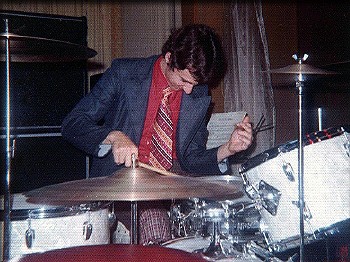
I joined the Musician's Union and started playng nightclubs in 1970 (Age 16)
I wasn't old enough to be in bars, but I had been playing 6 years by then, so most club owners would let me play if I promised not to drink, and sat in a specific place. These same club owners would often let me use their piano, to keep writing charts, and that was a huge help. At this time in my life, I Iiterally played drums 8 hours a day or more, every day. I was completely obsessed, and could practice freely at home, for about four years. I took lessons, and played in the marching band, concert band, local orchestra and youth orchestra, various percussion ensembles, jazz groups, big bands, worked in a local drum shop, and was drum section leader for my last two years in high school. I figured I could sleep when I turned 30.
And, adding to the frenzy... I studied piano, composition, arranging, trombone, and tenor sax with private teachers, and wrote 130 band charts, by the time I finished high school. Crazy... One or two charts a week sometimes, by hand. I spent most of my spare time at local colleges, begging them to play my charts, which were often less than fabulous.
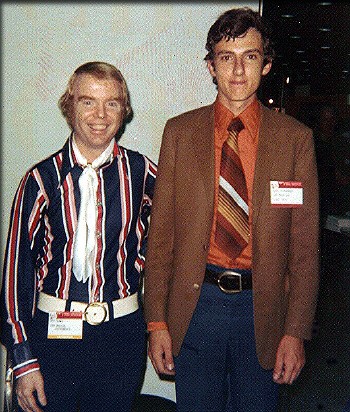
Roy Burns, a great drummer, and me, at the 1972 NAMM show in Chicago. (Age 18)
Roy Burns was the Staff Artist for Rogers Drum Company, and had just come out with some great educational albums too. We're both sweaty, because we had both been playing drums at several exhibits. Roy was very helpful, being firm but kind, and was a big influence, on my early habits.
Roy Burns founded, and was the President of Aquarian Drumheads, and he's been making great products for drummers for many years. Sadly, Roy passed away in 2018.
I also met Gene Krupa, David Garibaldi, Tony Williams, Louie Bellson, Armand Zildjian, Remo Belli, Don Osborne Jr., and others at the same show! (Age 18)
I finished high school in Ohio, and could drive to Chicago, Dayton, Philadelphia, Detroit, etc., so I followed all my favorite big bands around as much as possible.
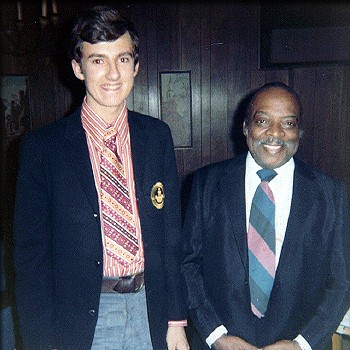
My apologies for some of the clothing in these photos. When you're young, color coordination isn't always at the top of your list. Count Basie was completely nice, but I think he had been partially blinded by my shirt.
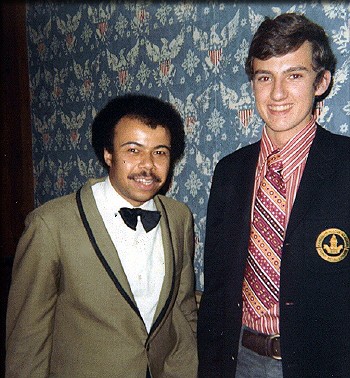
Harold Jones, drummer with Count Basie, in 1971 (Age 17)
Harold said "Nice Tie". Later, when I asked him how he muffled his (24-inch) bass drum, which had such a great sound, he said "Muffling? Man, I need all the resonance I can get". That was enlightening to me, and I never forgot it.
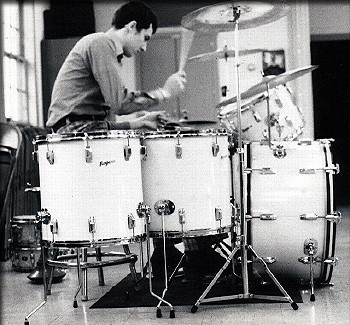
Arranging and Drumming for the Air Force
I went on the road for a year after high school, then enlisted in the Air Force as a musical arranger, in 1974 (Age 20) The best thing about being an arranger in the Air Force was that all I had to do was write scores. Individual parts were done by a "copying staff". I also took the Berklee arranging course, studied with another arranger there, obtained "training material" including books like Maheagan's, "Piano Improvisations", and had access to an 8-track tape recorder. Bonus...I was allowed to use the band room 24 hours a day, so again, I got several hours of drumming in every day... I've always been a drum addict, and miss this kind of practice today. (That's apartment life.)
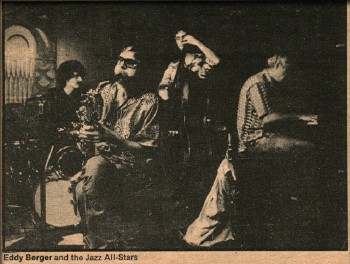
Sitting in with "Eddie Berger and the Jazz All-Stars", at "The Rainbow Gallery", in Minneapolis, 1978. (Age 24)
Got a (honorable) discharge from the Air Force, went out of my mind briefly, then went on the road for another couple of years, ending up in Minneapolis, in 1978. There, I became a hippie/beatnik, studied karate 5 days a week for a couple of years, took flying lessons, played jazz, wrote some charts for the University of Minnesota, and jammed with everybody.
I wrote two charts for Buddy Rich, (which were never recorded) went broke again, took a tour through eastern Europe with a horrible band, (long story) and just generally acted weird.
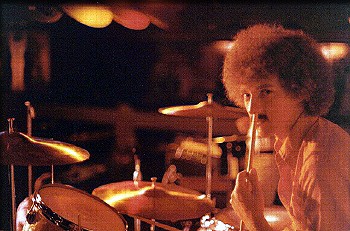
Sorry... The pose above was mandatory for all drummers in the late 1970s and early 1980s. (Age 26) - Nice hair.
I formed my own band for a year, and went broke again, then decided to "sell out", and became a show band lounge lizard. ...anything to keep playing all the time. (50 weeks a year)
As a rule, the music wasn't too good, but show bands typically got to play a little wider variety of music, (medlies, mostly) and could afford food, which was good. It was the "Disco" era, and the music was incredibly shallow. I lived for the day off (Sunday, usually) so I could drive someplace and see Buddy Rich, or go skydiving, which became one of my addictions. I was involved in quite a few recording projects in those days, but none were ever very successful. ("FM soft-rock" type stuff)
At an audition for one of the show bands I played with, I met a tremendous bass player. He was one of the pioneers of tapping, slapping, using drum rudiments as finger patterns on the bass, etc.. He was so energetic, that he actually spooked the leader, who thought he might be "too much" for this supposedly high-energy show. The bassist was, ironically, Beaver Felton.
Beaver has always been an explosive bass player, and I was honored to meet him and play with him, shortly before his auto accident. Beaver continues to kick ass today! Click here to hear a sample (72k) MP4 clip from one of Beaver's instructional videos, "Slap Happy". (Now, you see what I mean?) Today, Beaver is at Bass Central.
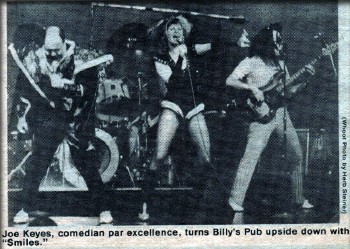
Goofy costumes and pyro at "Bally's", in Atlantic City - mid 80s
The natural progression in those days was to "graduate" to casino acts, which meant even more goofy outfits, better food and clubs, and a lot of medlies. This was a very high-energy, but silly atmosphere, which I spent 5 years in. (Age 26) Much ado about nothing, mostly, with the occasional "moment" thrown in. Still, I put in 1000 hours per year on the drums, which was good.
My first trip to Atlantic City casinos was with a family of lunatics who were really crazy, but very energetic and fun to play with. The act was called "Lou Carabollo and Company". When we weren't starving to death and/or threatening to kill each other, the music was pretty intense. The piano player shaved his head bald on opening night at Resorts International, and was becoming obsessed with Scientology. The sax player looked like the puppet on the Muppet Show. The crowd and other employees just thought it was all part of the act, and barely noticed. (!) In Las Vegas, we played at The Riviera, The MGM Grand, The Sands, and Union Plaza. Later bands, including Joe Keys - ("Smiles") were somewhat more civilized, but still insane. We spent a lot of time being dead tired and irritable.
The best part of the casino experience for me was that we got to work with Sam Butera at "Resorts International", which was great! The late Chuck Ingolia (Stevens) was the drummer, and we became good friends. He was a very strong drummer, and a great individual, and I miss him. The whole band was extremely good and tight. Remember "Just a Giggolo"? Their version (with Louie Prima) was the original.
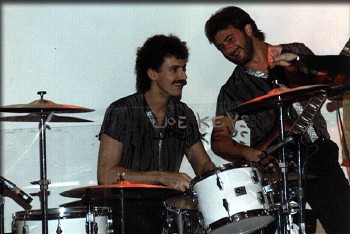
In the aquarium...
Inevitably, part of the show band routine included Top 40 dance music. I was playing very loudly, (with earplugs) in a plexiglass "aquarium" to isolate the sound, and triggering a drum machine with transducers attached to the drums. (Age 28) ...It was a drag.
These "show bands" were tedious, and a lot of physical work...
We rehearsed 4 to 5 days per week, for 2 to 4 hours, to keep up with Top 40, and to work out the special show arrangements. On the gig, we changed costumes every set (4 to 5 sets a night) and were completely soaked with sweat at the end of each one. There was literally no "dead space" in either the shows or the dance sets, because it was all a "show" of sorts.
When I quit this band, the leader wanted me to write the drum parts out for all of the 80 or so Top 40 tunes. When I realized that I could write all those parts on a cocktail napkin, I knew it was time to go. The pop music of that era was mostly composed of 2-bar repeating patterns, and... sucked. But... These show bands were (surprisingly) the ones that got me to Montreal, the Bahamas, Aruba, Europe, and Saudi Arabia. Although I joke about it now, I did my best while I was there.
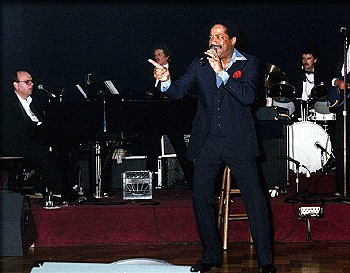
With Dee Clark
When the casino act I was working with folded, I decided that I would never again do that kind of thing. I got a haircut, went back to playing a simple acoustic drum setup, and played big band gigs and cruise ships. This was fun, and very easy work, and the food was great. Scuba diving, sun tan, and lobster... Yeah!
I did a series of jobs for about a year with T.O. Earnhart (pianist/musical director from "American Bandstand") which included every Motown act I can think of. Here's a performance with the late Dee Clark, a great guy. (Age 30) I worked with him on ("Emerald Seas") cruise ships the year before he passed away.
ALL of these acts were very low pressure. The leaders didn't want to rehearse, unless they were worried about a particular moment in the music, and they were ALL very cordial, laid-back people. I had no bad experiences with any of them.
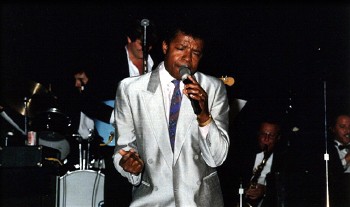
"Little Anthony"...not so "Little" any more.
His show was one of the more professional ones I played, and included some nice big band charts. (Age 30) During this same time, I played with Chuck Berry, Little Anthony, Dee Clark, Drifters, Coasters, Platters, Ink Spots, Ace Cannon, Barbara McNair, Sherrils, etc..
While doing these jobs, I was able to find and buy the best drums I've ever had... some Slingerland "Radio King" drums, made in about 1938. I finally quit looking at drum catalogs.
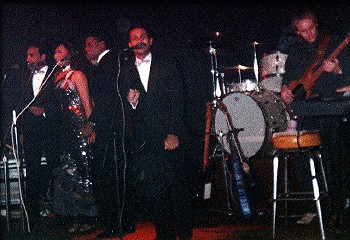
With "The Platters"
After a couple of years playing the cruise ships while being based in Indiana, (I know, that sounds strange.) I was happy to join a country/rock/blues band called "Reno", from Alabama. This band had good recording potential, and we operated our own night club for about a year, to ensure we had a stable home base. Here we are backing up "The Platters". (Age 32)
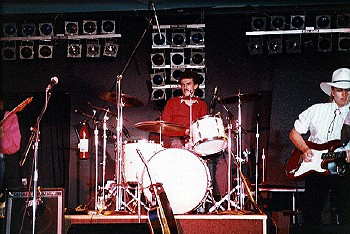
With "Reno"
In the late 80s, when the pop music scene was flooded with acts trying to "get a deal", a lot of us were trying to sneak in the back door, through the country music scene, following the lead of people like K.T. Oslin. Suddenly, we were wearing cowboy hats, but playing funk and blues. More on Donna Hopkins, the real focal point of that band, here. She's playing blues now, and really plays guitar, and sings great!
"Reno" stuck together for a couple of years, winning some recording time in a talent contest at "Miss Kitty's", in Atlanta, Georgia. We made some recordings that were misdirected and badly produced (outside our control) and they never went anywhere. The band had business success in Atlanta though, and played "The Underground", "Miss Kitty's", etc.. (Age 35)
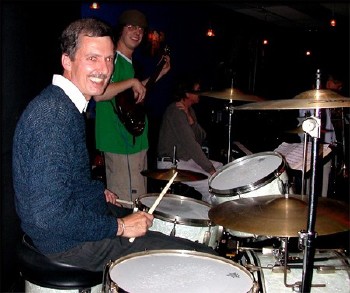
Off the road at last (Age 42)
I got completely off the road, (Age 40) and played locally around Georgia and Alabama for several years, enjoying the luxury of having an actual apartment for the first time in my life. While I was doing that, I finally decided to start playing what I wanted, rather than being subject to commercial whims and/or bands that I thought were too conservative. That led to a deeper, more-constant involvement in jazz, which has always been my first love.
I moved to Anchorage in 1995, which is a beautiful place, with some fantastic artists and musicians. I get to play a very wide variety of music here, including Brook Faulk, and some really fun jazz with my own bands, as well as people like Melissa Bledsoe Fischer. It's been a much freer environment to develop in than when I was on the road.
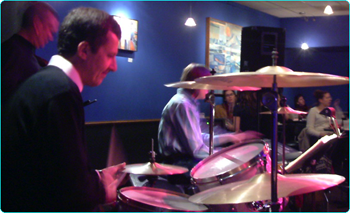
What's next? We'll see...